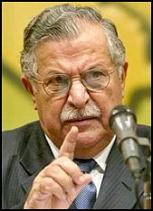By Robert F. Worth The New York Times - TUESDAY, SEPTEMBER 6, 2005

BAGHDAD President Jalal Talabani of Iraq issued a bitter rhetorical broadside against other Arab countries Monday, saying they had insulted Iraq by not sending diplomats to Baghdad and by not sending condolence letters about the stampede last week in which nearly 1,000 Shiite pilgrims were killed.
 The president spoke just after two dozen insurgents staged a brazen dawn raid on the heavily guarded offices of the Interior Ministry in Baghdad, killing two police officers and wounding five. Two British soldiers also were killed Monday by a bomb in southern Iraq.
The president spoke just after two dozen insurgents staged a brazen dawn raid on the heavily guarded offices of the Interior Ministry in Baghdad, killing two police officers and wounding five. Two British soldiers also were killed Monday by a bomb in southern Iraq.Talabani echoed and amplified complaints by other Iraqi leaders about the Arab states' failure to acknowledge the stampede, which stunned Iraqis and led to the highest one-day death toll since the American invasion in March 2003. The complaints, largely from Shiites and aimed at the Arab world's Sunni leaders, hinted at a sectarian bias against Iraq, where Shiites make up about 60 percent of the population.
"We stood with our Arab brothers in their hard times," Talabani said at a news conference. "For instance, we sent a letter expressing our condolences on the terrorist attack which claimed a lot of innocent lives in Sharm el Sheik."
Prime Minister Ibrahim al-Jaafari hinted at a similar criticism Monday when he was asked about the emir of Qatar, who donated $100 million to American victims of Hurricane Katrina but nothing to victims of the stampede.
"I'm not condemning what he did, but he should think of Iraq," Jaafari said.
The comments by Talabani and Jaafari come during heightened tension with other Arab nations. Last week Amr Mousa, secretary of the Arab League, issued a public criticism of Iraq's new constitution - largely written by Shiites and Kurds - in which he echoed the criticisms of some Sunni Arabs in Iraq. The Sunnis have opposed two provisions in particular: one that would create largely autonomous federal regions, and one that describes Iraq as an Islamic country but not an Arab one.
Some Iraqi leaders asked why Mousa was willing to denounce the new draft constitution now, after the Arab League had been notably silent about Iraq's lack of a constitution or basic human rights under Saddam Hussein.
Talabani, a Kurd, also said the two major Kurdish political parties had agreed to support Sunni demands for language in the constitution that declared Iraq an Arab nation. Although the charter was presented to Parliament last week, there have been talks in recent days aimed at making final revisions in order to win Sunni support.
If the document is not modified, some leading Sunnis have said, they will organize a campaign to defeat it when it goes to a national referendum Oct. 15.
A delegation of Sunni leaders visited Kurdistan on Monday to discuss the constitution and Kurds' participation in future elections, Talabani said.
Talabani also complained about the lack of Arabic diplomatic representation in Baghdad, calling it "an insulting issue for the country." Iraq and the United States have urged other Arab countries to send diplomats to Baghdad, in hopes that the gesture would bolster the Iraqi government's legitimacy and undermine support for the insurgency.
But risk is also clearly an issue. In July, two Algerian diplomats and an Egyptian diplomat were abducted and killed by insurgents. Al Qaeda in Mesopotamia, the insurgent group led by Abu Musab al-Zarqawi, claimed responsibility and has threatened to kill any Arab diplomat in Baghdad.
The attack in Baghdad on Monday began at 6:30 a.m., when four black sedans raced up to a checkpoint outside the Interior Ministry, officials said. Firing belt-fed machine guns and rocket-propelled grenades, the group of about two dozen insurgents fought the ministry guards for 15 minutes before driving away. American helicopters could be seen flying over central Baghdad for hours afterward, as U.S. Army soldiers patrolled the streets for the attackers.
The two British soldiers were killed when a bomb detonated near their patrol in southern Iraq, British officials said. The bombing took place in Zubayr, a town just south of Basra that is a stronghold for Sunni extremists and the site of many earlier attacks.


